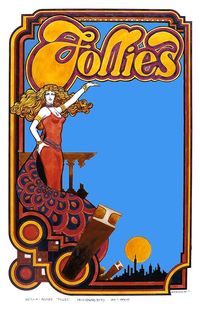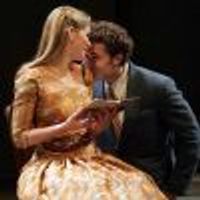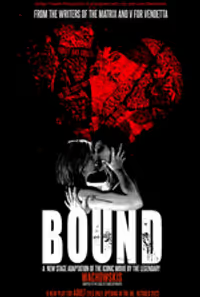Just back from the first preview of PORGY AND BESS....
philcrosby
Broadway Legend Joined: 2/17/04
#50Just back from the first preview of PORGY AND BESS....
Posted: 8/19/11 at 10:04am
The difference with film versions, of course, is the authors sell the rights to their work to the film-makers. And in case that is unclear, what that means is, the film-makers can do whatever they want to the property. We can all hope they respect it and keep the spirit of the stage work alive. But often they don't.
One of the most brilliant of film producers, Arthur Freed, threw out half of Bernstein's score for "On the Town" after spending a lot of money to purchase the rights for the movie version. That's only one example.
Right? Wrong? Immaterial. The filmmakers bought the right to do that.
In this case, the estates of Gershwin and Heyward have the right to do this ... they aim to create a "new work" that can be copyrighted fresh and supply a stream of revenue to the heirs, long after "Porgy and Bess" the opera has become public domain.
It's all about the money, and do not fool yourself one minute it is not. It may have very talented people working on it, but it's about the money.
#51Just back from the first preview of PORGY AND BESS....
Posted: 8/19/11 at 10:21am
The blessing is that they probably won't be seeing too much cash inflow from this project in the long run. They'd do better putting money into the restoration and home video release of the 1959 film, regardless of current corporate opinion of it. At least it can be claimed to be a valid PORGY AND BESS.
Watch the film sometime. Hear how Dorothy Dandridge captures Heyward's inner rhythms and poetry (despite Otto Preminger's heavy-handedness). This seems to be something A.R.T has decided to throw out wholesale.
#52Just back from the first preview of PORGY AND BESS....
Posted: 8/19/11 at 10:27am
^ Totaly off topic: Love justoldbill's avi. Saul Bass' "Carmen Jones" rose.
Okay y'all can go back to arguin'
#53Just back from the first preview of PORGY AND BESS....
Posted: 8/19/11 at 10:41amActually, even before the '38 Howard-Hlller classic film of Pygmalion, Henry Beerbohm Tree took similar liberties with the last scene of the play on stage, also inserting a romantic ending, much to Shaw's chagrine.
#54Just back from the first preview of PORGY AND BESS....
Posted: 8/19/11 at 10:46amThanks. It's a TERRIFIC design, isn't it? I've always wondered, with all of Arthur Laurents' and Stephen Sondheim's carping about the film of WEST SIDE STORY, why they allowed the front of the Palace Theatre to recently look like a major revival of the film? I hope the Bass estate (or whoever) got their cut.
#55Just back from the first preview of PORGY AND BESS....
Posted: 8/19/11 at 10:51am
"Changing the title to the female character says this is gonna be more about Eliza and she will get her happy ending."
Beg to differ. The ending of "My Fair Lady" is, if anything, less about Eliza than the end of "Pygmalion." Shaw gave Eliza her freedom at the end of his play, in what many have argued may have been suggested by the freedom Ibsen gave Nora in "A Doll's House."
To the extent the ending of "Pygmalion," is relatively "unhappy," it is Henry's loss of Eliza that makes it so, not the converse.
The romantic and wonderful ending of "My Fair Lady" is equally happy for both Henry and Eliza, not especially happy for the "Lady" in question.
SporkGoddess
Broadway Legend Joined: 7/27/05
#56Just back from the first preview of PORGY AND BESS....
Posted: 8/19/11 at 10:56amSee, but the new ending doesn't even sound that happy. If you're gonna do revisionist and spit on the intent of the original creators, go all the way darnit!
#57Just back from the first preview of PORGY AND BESS....
Posted: 8/19/11 at 11:08amHenrik, that's an excellent point! I never thought of it that way.
#58Just back from the first preview of PORGY AND BESS....
Posted: 8/19/11 at 11:15amKeep in mind, Eliza chooses to return. And in doing so, hasn't lost one bit of her freedom. But this is about Bess. The loss of Porgy and the persuasion of Sportin' Life (and his happy dust) debilitates her freedom. This is where A.R.T. goes awry. In demonstrating her "strength", Bess LEAVES OF HER OWN ACCORD, without mincing words, evidently. This cheapens, even negates, the final scene of the story. Even in the novel, where Bess is overpowered by a group of riverboat men and taken to Savannah, she's lost her freedom of decision. Many women can recognize this. THIS is why Porgy sets out to find her. (He doesn't do so in the novel. There, he is left old and alone. His lost love is truly tragic.) At least in the opera, there's a sense of hopeful uplift. At A.R.T., even Porgy seems to (momentarily) turn against her. I won't accept that.
#59Just back from the first preview of PORGY AND BESS....
Posted: 8/19/11 at 11:21am
Oh, come now. The change in ending from Pygmalion to My Fair Lady is MASSIVE. It completely alters all that has come before it. Of course, both work. Beautifully.
And, clearly, the ending of Porgy and Bess changed from the novel and is now being rethought for this musical version. Why would anyone say 'I won't accept that' without seeing it? It may be awful...it may be wonderful...it may be 'eh'. I have absolutely no idea. But I'll form my opinion about it when I see it.
#60Just back from the first preview of PORGY AND BESS....
Posted: 8/19/11 at 11:32amIf someone told me there was a new musical of HAMLET where everyone remains alive and well and they all take a house together by the seashore, I wouldn't have to sit through it not to accept it.
#61Just back from the first preview of PORGY AND BESS....
Posted: 8/19/11 at 11:33am
"Keep in mind, Eliza chooses to return. And in doing so, hasn't lost one bit of her freedom."
I agree with that. What I disagree with is that the ending of Pygmalion is, for Eliza, unhappy, or that the ending of "My Fair Lady" is more about Eliza's happiness than it is about Henry and Eliza's happiness.
#62Just back from the first preview of PORGY AND BESS....
Posted: 8/19/11 at 11:38am
Changes to endings in adaptions are nothing new, unfortunately. Most of the time, they make absolutely no sense, but there is the rare occasion when it does.
In Gluck's opera version of the Orpheus and Eurydice myth (Orfeo), instead of Eurydice being sent back into Hades after being looked upon by Orpheus, Cupid comes to the rescue, saves Eurydice, and brings her back to the normal world. It's completely bizarre, especially after an entire depressing, melodramatic, 90 minute opera. It's totally pandering to the audience. I'm hoping that we're not getting the same deal here with Porgy and Bess. Still very anxious to see it.
#63Just back from the first preview of PORGY AND BESS....
Posted: 8/19/11 at 11:43am
But, I've seen a HAMLET in which the Murder of Gonzago was actually done to THRILLER (original choreography and all). It was bizarre, off-putting and totally marvelous. The whole deconstruced piece was a joy to sit through.
And, of course, we've seen Hamlet's story told through the eyes of two minor characters...and we've also encountered a 'what happens after they all died' Hamlet in the form of FORTINBRAS, a play I find delightful.
Artists are always going to use preceding works to explore underlying themes, or problematic structural issues, what have you. Theatre has mostly been one big Frankenstein's monster for the last few hundred (thousand?) years. Some of these explorations work, most do not. But I refuse to crucify artists who explore, even when they sound arrogant doing it.
#64Just back from the first preview of PORGY AND BESS....
Posted: 8/19/11 at 11:45am
"Sorry, henrik, when I asked that question, I was assuming you had read what I read upthread about the new ending."
Thanks, Growl, actually I hadn't read your post describing the production's final narrative and I appreciate your posting it. I am not impressed with the substituted scenario as it appears in your post. But that doesn't change my position that I'm in no position to truly assess it until I see the entire show, and how the resolution plays in its context.
We live in an age where classics are being continually deconstructed. Which can, depending on many creative factors, be exciting or boring, elucidating or downright cheap. I still find it odd that this particular production of "Porgy and Bess" should engender so much premature outrage.
#65Just back from the first preview of PORGY AND BESS....
Posted: 8/19/11 at 12:09pmNot premature at all. The creative staff has already stated their intentions in The New York Times. And those intentions have already been seen in performance.
#66Just back from the first preview of PORGY AND BESS....
Posted: 8/19/11 at 12:26pmJusttold, the jeers started well before the show was seen by the jeerers, now that the show has been seen by some, the jeers continue from folks who have not seen the show: it's one thing to judge a production upon viewing and another to judge it by the stated intentions of its creative team; and, finally, creative teams are in the habit, for better or worse, of describing intentions that don't necessarily correspond to everyone's perception of what actually happens in performance.
EdwinBooth
Swing Joined: 8/19/11
#67Just back from the first preview of PORGY AND BESS....
Posted: 8/19/11 at 5:24pm
I saw the second preview last evening and have to say the new ending doesn't improve on the original for me. Totally changes Bess's character and the writing is clunky. While the audience gave the performance a standing ovation, to me the over all feeling I was left with was that it was a big turgid (conducting was not great; no big sweep to the lines and shaping).
Thrilling to hear Audra in this music, of course. To my ears, Norm sounded overpowered by her in their duets and didn't have the gravitas that a great Porgy has by the time he reaches "Oh Bess, oh where's my Bess" and then "Oh Lord I'm on my way". David Alan Grier brought home both of his big numbers.
Early days and interesting to see how it evolves.
#68Just back from the first preview of PORGY AND BESS....
Posted: 8/19/11 at 5:31pm
I'm not surprised to hear the possibility that Norm Lewis is underwhelming. It was so disappointing when the casting was announced. He's got a terrific voice in the right parts, but as an actor he's boring as $h!+.
#69Just back from the first preview of PORGY AND BESS....
Posted: 8/19/11 at 5:59pm
But I refuse to crucify artists who explore, even when they sound arrogant doing it.
I know what you mean, Robbie. Burning them at the stake is ever so much more fun.
#70Just back from the first preview of PORGY AND BESS....
Posted: 8/19/11 at 6:02pm
And the aroma! The aroma!
I love the smell of burning artists in the morning. Anytime, really.
#71Just back from the first preview of PORGY AND BESS....
Posted: 8/19/11 at 6:45pm
"I'm not surprised to hear the possibility that Norm Lewis is underwhelming. It was so disappointing when the casting was announced. He's got a terrific voice in the right parts, but as an actor he's boring as $h!+."
I just saw the second preview - Norm is not underwhelming as Porgy. In any other production of Porgy & Bess, he would be the standout, but next to Audra McDonald he just can't compare.
As for Summertime; I knew it was taken down, but it's not noticeable to anyone who isn't intimately familiar with the show. I've seen the Porgy & Bess movie, so I only know the piece in passing, but as far as I could tell the song was only taken down a few steps. It's still gorgeous, and this production is excellent.
#72Just back from the first preview of PORGY AND BESS....
Posted: 8/19/11 at 8:33pmDid any of you guys see the London version of Porgy and Bess the Musical directed by Trevor Nunn?
Gaveston2
Broadway Legend Joined: 6/28/11
#73Just back from the first preview of PORGY AND BESS....
Posted: 8/20/11 at 3:52am
henrik is certainly entitled to believe Higgins is worse off than Eliza at the end of Pygmalion. Shaw's afterword isn't actually part of the play.
But it should be noted that to Shaw, Eliza's future was equally dim. He writes that she will end up miserable, having to support Freddy while he mistreats her.
Again, not in the play on stage, so not binding on henrikegerman. But that's what Shaw thought.
HVicQ
Swing Joined: 8/19/07
#74Just back from the first preview of PORGY AND BESS....
Posted: 8/20/11 at 11:33amI saw the production the other night. Parts were very good, parts were very messy. On the whole though, I would say it was solid but underwhelming. Didn't really buy McDonald as Bess. I felt she was REALLY pushing to convince us that she could pull off this role. It just felt like she laid it on a little too thick. I thought Lewis faired much better. He was in magisterial voice and I found his performance to be quite moving. I agree with other posters that he needs to find the pathos more in the second act but I think by the time the run at ART is over he will definitely get there. Also really liked Josh Henry a lot as Jake. Amazing voice, and great presence. As a whole I would say the biggest problem with the production is its consistency (or lack thereof.) It just seemed like all of the characters were not from the same world. Like they all just chanced upon each other in Catfish Row. My biggest reservation absolutely though were the vocal inconsistencies. Nikki Renee Daniels is a talented girl with a lovely soprano... so why are they having her sing Summertime in a low chesty key? And by far TOO. MUCH. RIFFING. This is Porgy and Bess, not In the Heights. It needs to be sung way more legit than it is now. The cuts were choppy. David Alan Greir's numbers though strong certainly, just didn't seem to fit in. I think it can be strengthened by the time it hits New York but they certainly have their work cut out for them.
Videos









